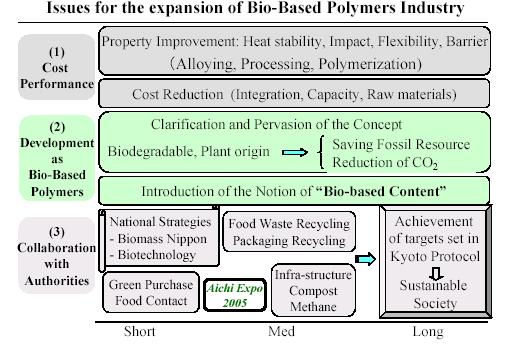Tadashi Yagi
LACEA Dept., Polymer Business Development Div., Mitsui Chemicals, Inc.
Shiodome City Center 1-5-2, Higashi-Shimbashi, Minato-ku, Tokyo 105-7117, Japan
Tadashi.Yagi@mitsui-chem.co.jp
Polyactic acid(PLA) is derived from plants or biomass which grow by using the light of the sun as energy and absorbing the water and carbon dioxide in the air. The bio-based polymer such as PLA is a new material which contribute to the curbing of the increase in greenhouse gases and the saving of fossil resources. In Japan the utilization of the biomass and the bio-based polymer(as biomass plastics) are promoted on two national strategies ”BT strategy” and “Biomass Nippon strategy”. A turning point is approaching at which the bio-based polymers industry will become a reality.
PLA is finding an increasing number of applications for packaging / containers area such as film / sheets and straps, agricultural / civil engineering area such as mulch film and nets, and compostable bag. In recent years, efforts are being made to apply PLA to durable goods areas such as electrical appliances, personal computer parts and housing, optical discs and automotive parts. Use of PLA is spreading to textile areas including apparel and carpets.
PLA product will be recognized as the Eco-product to the environment from the view point of LCA (Life Cycle Assessment) and the bio-based content.
There are three major issues for the expansion of the bio-based polymers industry.

论文来源:1st International Conference on Technology and Application of Biodegradable Polymers and Plastics,October,2004